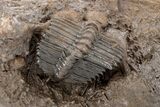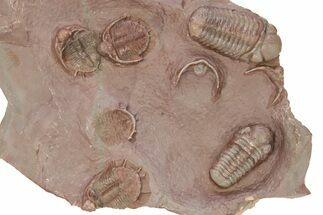This Specimen has been sold.
1.4" Spiny Cyphaspides Ammari Trilobite - Exceptional Detail
This is a beautifully prepared example of a rare, Cyphaspides ammari trilobite. It's partially enrolled but would be about 1.4" long if outstretched. While we've had many examples of other Cyphaspides species from the localities near Jorf we've only been able to acquire a few Cyphaspides ammari from a different location.
This particular species was just described in 2019, a link to the paper is below.
Species of the Devonian aulacopleurid trilobite Cyphaspides from southeastern Morocco
This particular species was just described in 2019, a link to the paper is below.
Species of the Devonian aulacopleurid trilobite Cyphaspides from southeastern Morocco
About Trilobites
Trilobites are an extinct class of marine arthropods that thrived for nearly 270 million years, from the early Cambrian to the end of the Permian period (around 521 to 252 million years ago). They are one of the most successful and diverse groups in the history of life, with over 25,000 described species spanning a wide range of sizes, shapes, and ecological niches. Known for their distinctive, segmented exoskeletons, trilobites provide invaluable insights into the evolutionary history of arthropods and the dynamics of ancient marine ecosystems.
Trilobites are an extinct class of marine arthropods that thrived for nearly 270 million years, from the early Cambrian to the end of the Permian period (around 521 to 252 million years ago). They are one of the most successful and diverse groups in the history of life, with over 25,000 described species spanning a wide range of sizes, shapes, and ecological niches. Known for their distinctive, segmented exoskeletons, trilobites provide invaluable insights into the evolutionary history of arthropods and the dynamics of ancient marine ecosystems.
SPECIES
Cyphaspides ammari
LOCATION
Near Erfoud, Morocco
FORMATION
Bou Tchrafine Formation
SIZE
1.4" long (if outstretched)
CATEGORY
SUB CATEGORY
ITEM
#210209
We guarantee the authenticity of all of our specimens.
 Reviews
Reviews
















